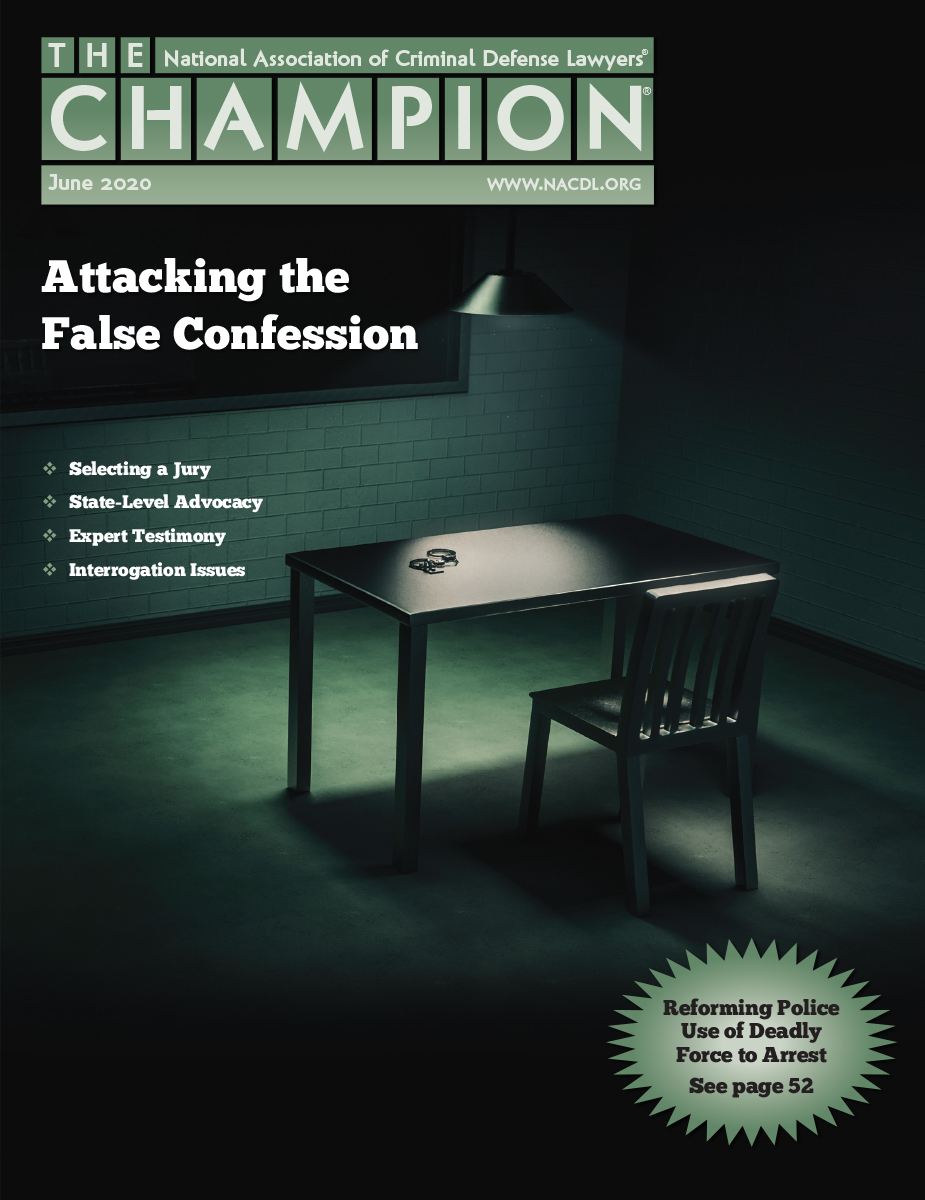June 2020

Attacking the False Confession: Selecting a jury, hiring an expert, and examining police interrogation methods
Articles in this Issue
-
Affiliate News
What events are NACDL affiliates hosting this month? Find out here.
-
An Overview of Expert Psychological Testimony in False Confession Cases
When contesting a confession as false, it behooves the defense lawyer to understand the psychological principles that got the defendant into his predicament. The authors provide an overview of three different expert witnesses that may be able to assist the defense: false confession experts, clinical forensic experts, and polygraph experts.
-
Attacking the False Confession: Advocacy in the State Forum
Wrongful convictions stemming from false confessions and a growing field of false confession research have paved the way for greater public understanding of factors that lead to false confessions. The authors explore the underlying causes of false confessions and the importance of state-level reform.
-
Book Review: Criminal Defense-Based Forensic Social Work Edited by Ashley Ratliff & Maren Willins
This month Chloe Reyes and Patrick Keenan-Devlin review Criminal Defense-Based Forensic Social Work by Ashley Ratliff and Maren Willins (Editors).
-
Book Review: No Place on the Corner by Jan Haldipur
This month Thomas J. Farrell reviews No Place on the Corner: The Costs of Aggressive Policing by Jan Haldipur.
-
From The President: Third-Party Doctrine in the Age of COVID-19
Although businesses and individuals were sharing information and data with third-party vendors long before the COVID-19 outbreak, use of remote work tools is sure to endure long after the outbreak passes, making privacy concerns even more important.
-
How Interrogation Became Interviewing in the UK: Can It Happen in the US?
Police interrogation, with its connotations of coercion and a confession-oriented approach, is a controversial part of policing in the United States. In the United Kingdom, however, coerced false confessions have become consigned to history. How did the UK do it?
-
Jury Selection in False Confession Defense Cases
Some prospective jurors simply cannot accept the idea that a client’s confession was false. Finding these jurors and striking them, preferably for cause, is the goal in jury selection when a false confession is involved.
-
Letter to the Editor: Court Interpreters Help to Protect the Constitutional Rights of the Accused.
In her letter to the editor, Katty Kauffman points out that court interpreters play a vital role in protecting a defendant’s constitutional rights.
-
NACDL News: Groups Issue Guidance for Public Health Approaches in Criminal Justice COVID-19 Response
NACDL News for June 2020
-
NACDL News: NACDL Decries Criminalization as Response to COVID-19, Warns of Disparate Impact
NACDL News for June 2020
-
NACDL News: The Vanishing Trial: FAMM, NACDL Launch Documentary About the Trial Penalty
NACDL News for June 2020
-
Police, False Confessions, and a Framework for Change in the US
The mere act of recording an interrogation does not prevent someone from confessing to a crime he did not commit. To truly protect against false confessions, it is necessary to transform police interrogation methods so that they keep up with science and best-known practices. This article presents a framework to reduce police-induced false confessions.
-
Reforming Police Use of Deadly Force to Arrest
State laws should make it clear that allowing suspects to escape immediate apprehension for almost every crime is a more reasonable alternative than killing them. The use of deadly force should be reserved for instances when suspects are objectively an imminent danger to either a police officer or the public.
-
White Collar Crime Policy: The Perjury Factory in White Collar Cases
The testimony of cooperators in white collar cases is created in a perjury factory. The factory produces perjury through (1) multiple interviews with the government, (2) tactical use of the grand jury, (3) selective notetaking by prosecutors and agents, and (4) witness preparation.
